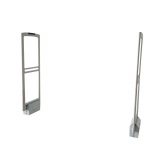The importance of RFID scanners in today’s world is incredible. These advanced devices are designed to capture data from RFID tags and transmit it to various applications for processing, thereby facilitating a seamless flow of information. The integration of RFID scanner solutions enables quick identification and tracking of items, which ultimately streamlines operations across numerous industries. When businesses implement RFID technology, they experience significant enhancements in accuracy, efficiency, and security, which transform their operational processes and improve overall performance.
Many industries are harnessing the power of RFID technology to drive innovation and efficiency. In the following sections, we will dive deeper into these applications and illustrate how RFID reading scanners are transforming different industries, showcasing their pivotal role in modern operational frameworks.
- Industry applications of RFID scanner devices
- 1. Enhancing inventory management
- 2. Accurate asset tracking solutions
- 3. Boosting warehouse operation through streamlined processes
- 4. Streamlining supply chain logistics with RFID scanner devices
- 5. Optimizing retail stock control
- 6. Enhancing security management systems
- 7. Improving healthcare facilities through RFID scanner devices
- 8. Event management and engaging attendees
- Conclusion
Industry applications of RFID scanner devices
What role do RFID scanners play in revolutionizing various industries? This section explores the diverse applications of RFID scanner devices, highlighting their impact on enhancing efficiency across different sectors.
1. Enhancing inventory management
RFID scanners significantly enhance inventory management by improving inventory accuracy and ensuring real-time tracking of items. One of the key benefits of using RFID technology in inventory management is the improvement in inventory accuracy. Traditional methods of inventory tracking, such as barcodes, often require manual scanning, which can lead to human errors. In contrast, RFID scanners automate this process, effectively reducing inaccuracies and ensuring that the data captured is precise and up-to-date.
Moreover, RFID technology provides businesses with real-time data visibility into their inventory levels. This capability allows for immediate updates on stock movements, which reduces the chances of overstocking or experiencing stockouts. With access to this timely information, companies are better equipped to make informed decisions regarding restocking and order fulfillment, ultimately leading to more efficient operations and enhanced customer satisfaction.
2. Accurate asset tracking solutions
Asset tracking is essential for efficient operations in manufacturing and logistics. RFID scanners make it possible to track assets accurately by capturing data in real time for each item, ensuring proper monitoring throughout its lifecycle.
In the manufacturing sector, RFID scanners are crucial for tracking raw materials and components as they arrive from suppliers. These devices enable manufacturers to monitor work-in-progress items seamlessly on the production line, allowing for better workflow management and reducing bottlenecks. Additionally, RFID technology ensures that finished goods are correctly inventoried and dispatched, enhancing overall operational efficiency.
3. Boosting warehouse operation through streamlined processes
Warehouse operations benefit significantly from the precision brought by RFID technology. By enhancing processes such as receiving and shipping goods, RFID scanners facilitate seamless operations. When goods arrive at a warehouse, RFID tags can be scanned automatically, ensuring immediate and accurate recording of inventory. This eliminates the need for manual entry and reduces potential errors.
The improved recognition and validation of items play a crucial role in overall warehouse efficiency. RFID systems can identify and track items in real time, offering a comprehensive view of inventory levels and locations within the facility. This level of detail aids in prompt decision-making and streamlines workflows.

4. Streamlining supply chain logistics with RFID scanner devices
In logistics, RFID scanners provide unmatched visibility into the movement of goods. Their applications encompass monitoring shipments from warehouses to distribution centers, ensuring accurate loading and unloading of cargo, and verifying the integrity and condition of products during transit. The use of RFID technology in these sectors enhances accuracy while minimizing human errors. As a result, companies experience substantial time savings and cost reductions, making RFID an invaluable asset in modern supply chain management. These features are crucial for maintaining the flow of operations and ensuring that each item is tracked accurately throughout its journey. Furthermore, this feature allows stakeholders to monitor the status and location of goods at any given moment, thus improving decision-making capabilities.
5. Optimizing retail stock control
The adoption of RFID technology in retail enhances stock control and customer service. Automating inventory checks ensures accurate stock levels, reducing out-of-stock and overstock issues, and leading to better management and operational efficiency.
A key advantage of RFID scanners is real-time inventory updates, providing instantaneous data for quick restocking and less manual checking time. This streamlines inventory management and allows retailers to respond swiftly to demand changes. RFID also significantly improves customer service. With accurate stock information, associates can assist customers effectively, ensuring they find desired products quickly. This fosters seamless interactions, boosting customer satisfaction and loyalty.
By leveraging RFID, retailers optimize stock control and create a more engaging shopping experience, crucial in today’s competitive market.
6. Enhancing security management systems
The integration of RFID technology into security management systems and access control mechanisms has significantly strengthened security measures in various environments. In corporate settings, RFID scanners ensure that only authorized personnel gain access to sensitive areas, thereby reducing risks associated with unauthorized entry. This heightened level of security is crucial for protecting confidential information and maintaining a safe working environment.
Public venues such as airports and stadiums benefit greatly from RFID solutions. These technologies enable quick and secure access for visitors, minimizing wait times and improving overall security. For example, airports use RFID-enabled boarding passes to streamline passenger flow while ensuring strict security checks. This not only enhances the efficiency of the boarding process but also provides an added layer of safety for travelers.
In summary, the deployment of RFID technology in security management systems and access control mechanisms offers a powerful solution for protecting assets and individuals across different industries. By leveraging these advanced systems, organizations can enhance their security protocols, ultimately fostering a safer environment for everyone involved.
7. Improving healthcare facilities through RFID scanner devices
Patient safety and resource management are critical concerns in healthcare facilities. RFID scanners offer precise equipment tracking solutions, ensuring the availability of vital medical equipment and pharmaceutical inventories within hospitals.
Accurate tracking capabilities provided by RFID technology enable healthcare providers to monitor the status and location of essential assets in real time. This capability reduces the risk of equipment shortages or misplacement, which can have serious repercussions on patient care. For instance, RFID tags on medical devices like defibrillators, infusion pumps, and surgical instruments ensure that these critical resources are always available when needed.
By integrating RFID technology into their resource management systems, healthcare facilities can deliver prompt and uninterrupted care services. This advanced technology significantly minimizes disruptions caused by manual searches for misplaced assets, thereby enhancing both patient safety and operational efficiency.


8. Event management and engaging attendees
Event organizers can use RFID technology to manage different parts of event planning and execution, whether it’s conferences or large festivals. These innovative solutions simplify the complicated tasks involved in hosting large crowds at specific locations during designated times. By implementing RFID-enabled wristbands or badges, attendees experience significantly reduced wait times when entering and exiting venues. This enhancement not only facilitates a smoother flow of foot traffic but also contributes to improved overall satisfaction for participants.
Moreover, RFID technology empowers organizers with real-time data on attendance, which is crucial for effective crowd management. This instant access allows for timely adjustments to event logistics, ensuring that any arising issues are addressed promptly. Security is another area where RFID shines; it helps maintain a secure environment by restricting access to authorized personnel only, thereby safeguarding sensitive areas within the venue.
The benefits extend beyond operational efficiency; real-time tracking of attendee movements enhances engagement and personalization. For instance, organizers can send targeted notifications about sessions or activities that align with individual interests, creating a more tailored experience for participants. Furthermore, the reduction in manual checks leads to fewer errors and quicker validations throughout various stages of the event.
By incorporating RFID technology into their operations, event managers can greatly enhance both logistical efficiency and attendee engagement strategies, ultimately leading to more successful and enjoyable events for everyone involved.
Conclusion
In conclusion, RFID scanners are crucial for improving efficiency and accuracy across various sectors. Therefore, it is essential to purchase your RFID scanner devices wisely for industry operations. Finding a reliable place to purchase RFID scanner devices wholesale is equally important to ensure quality and cost-effectiveness. Asecuri stands out as the best provider of security RFID scanner technology, boasting years of experience and expertise in the field. By choosing Asecuri, you can trust that you are investing in top-notch products that will enhance your operations. Don’t compromise on quality—explore Asecuri today and elevate your RFID solutions to the next level!
Partner up with Asecuri for all your RFID needs and experience the difference firsthand.


































